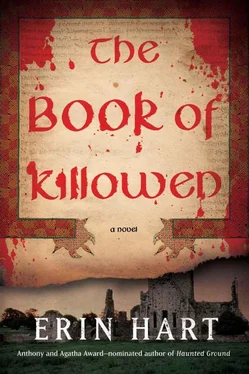Would Claffey be giving out like this if he’d known about the car and the two bodies—if he’d actually put them there, for instance? Feigning ignorance could just be a way of pointing suspicion away from himself. Stella was familiar with Claffey’s form; he’d never been what you might call a hardened criminal, just a small-time schemer who always walked a fine line when it came to the law. Probably due up in court next month for not paying his television license. Claffey and his moneymaking schemes were the stuff of local legend. There was the time he tried offering stump removal with an ancient Massey Ferguson tractor. He ended up rupturing a gas line, barely escaping with his life. The tractor had been blown to smithereens. Or that December night a few years back when the Christmas turkeys he was rearing in a heated shed had all escaped and perished out in the frosty fields. It wasn’t just where did he get such hare-brained notions, but where on earth did he get the money? Somehow there was never a shortage for the next big project. Burying a car in the bog was exactly the sort of thing Vincent Claffey might do, but was it in him to cross over the line into something like murder? Still, it was possible to underestimate the man.
Then again, it might also be significant who was not standing around at the perimeter of the crime scene. This bog bordered on three farms: Claffey’s place, Anthony Beglan’s property, and Killowen, and yet neither Anthony nor Claire Finnerty had even ventured over to see what was going on. Might be wise to leg it over there soon.
Stella’s phone began to vibrate, then she heard that wretched Lady Gaga song her daughter Liadán had programmed in as her personal ringtone. Bloody teenagers. She fumbled for the phone, trying to shut off the embarrassing noise as quickly as possible.
As usual, Lia didn’t bother with a greeting. “I’m going to stay at Da’s tonight. He said we could get an early start on the weekend, if it’s all right with you. And before you ask, I’ve collected the mail, folded all the laundry, and finished the washing up.”
Jesus, Stella thought, did she really sound like that to Lia? Had the past twelve months of single motherhood turned her into a total nag and a killjoy?
“So, is it?” Lia prompted.
“Is it what?”
“Is it all right with you if I head over to Daddy’s tonight instead of waiting until tomorrow?” Lia spoke each word distinctly, as if her mother was suddenly deaf as well as clueless. Stella heard the note of exasperation and could imagine the eye rolling going on at the other end of the phone. She considered the alternatives. Lia would be seventeen next Tuesday week. She had begun to spend every other weekend with her father these past few months, though they hadn’t worked out any sort of formal arrangement. In fact, Barry hadn’t pressed for specific visitation—probably just as glad not to have his daughter around, especially as he was busy bedding women closer to his daughter’s age than his own. The very thought made Stella ill. But as it turned out, Barry had very little to say about his part in their daughter’s custody; Lia had latched on to the idea of weekends at her father’s place when she learned that she could get away with murder. He let her eat what she liked, never made a fuss about her staying up all hours. She understood that if she said yes, she was being overly permissive; if she said no, she was being too hard. Those were the choices; there was no middle ground.
She had dragged out the decision as long as possible. “Well, since you’ve got everything in hand, I suppose it’s all right. But you’ll be back by five on Sunday, as usual?” Stella heard the subtle note of pleading in her voice and hated it, hated herself for allowing it to creep in. She had no doubt that Lia heard it, too.
“Yes. See you Sunday. Thanks, Mam.”
A loud click told her Lia was already gone.
Stella snapped her phone shut. It wasn’t as if she’d be home all weekend anyway, not with another dead man in the boot of that bloody car.
Fergal Molloy approached. “I got on to the revenue crowd about the property records. This bog is split into three turbary allotments, one for each of the adjoining properties, as you might expect. One belongs to Anthony Beglan, one is part of the Killowen parcel, and the other is attached to Vincent Claffey’s land.”
“So Claffey is the legal owner, as he says?”
“Looks like it. But here’s the thing he didn’t mention. This bog was designated as Special Area of Conservation two years ago. Claffey and his neighbors are getting compensation for not cutting here—a thousand euros per annum, each. I suppose Claffey wanted to be having his cake and atin’ it, too, probably counted on nobody checking.” Molloy jerked his head in the direction of the car. “Is it really him in the boot, Benedict Kavanagh?”
“We’ll find out soon. What news from Dublin?”
“Harcourt Street are sending the file over. Looks like Kavanagh went missing four months ago. He taped his television program on a Thursday afternoon, as usual—that was April twenty-first. But he wasn’t officially reported missing until the first of May.”
“Who made the report?”
“His wife, Mairéad Broome. She’s a painter—pretty famous in her own right, evidently.”
Stella felt a pinprick of irritation and told herself Molloy didn’t realize he was being patronizing. It was just what people said.
“What about a photograph?”
“They’re sending pictures to both our mobiles. Should have them here in a tick.” Molloy looked sideways at her. “You ever watch his program? Kavanagh’s, I mean.”
Why was everyone asking that? “I suppose you did.”
“Once in a while. Bit out of my depth, really. But it was amazing what he got away with. I think half the people who watched didn’t give a fiddler’s fart about philosophy; they just liked seeing your man have a go. Fuckin’ deadly with words, he was.”
These minor details were revealing a side of Molloy that Stella had never glimpsed before. All she knew was that he’d been born and reared in this part of the country, and had been seconded to the Antiquities Task Force before landing in Birr last year. What else did he do in his spare time? From the way he dressed, she’d already guessed he wasn’t in a darts league with the local Guards contingent. Molloy had been her partner for only a few months, and these things took time. But it had been brought home to her only too recently that you could work with, even live with, someone for years and never get a glimpse into his inner life.
“Any idea who tipped the media?”
Molloy shrugged. “Well, Claffey brought the chipper. Ask him.”
“Did you notice there’s no one here from Killowen?”
“You sure they’ve heard about all this?”
“Not much goes on here that Claire Finnerty hasn’t got a bead on.” Stella had investigated a suspicious fire at Killowen about three years ago. Hooligans, most likely, not enough evidence to pursue anything. But the investigation led to a few interesting chats with Claire Finnerty. There was something that nagged at her about the woman; she couldn’t say exactly what it was—a certain guardedness, perhaps, that helped kick her detective’s instincts into overdrive. “I’ll have a word with Claffey. Why don’t you have another little chat with the digger operator, see if he has any more to tell us.”
“You mean like why he was digging a drain in a protected bog, for instance?”
People who didn’t actually do police work might imagine that detectives were trained to deal only in facts, but the bottom line was that a large part of the work was sorting fact from fiction—also from hearsay, misremembered details, outright lies, ingrained biases, and personal opinion. There was no such thing as “the facts.” She tried to keep all that in mind as she rambled over to Vincent Claffey.
Читать дальше












